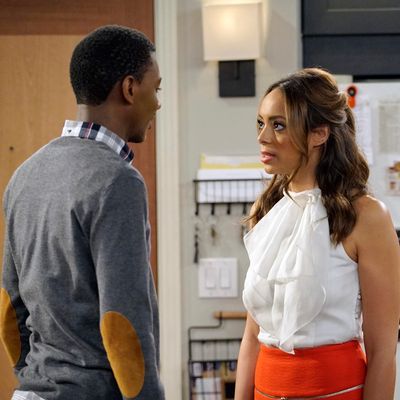
In last week’s episode of The Carmichael Show, Maxine got a substantial story line, furthering her character development and giving us a nice glimpse into her world. “Maxine’s Dad” continues this trend and digs even deeper, exploring Maxine’s complicated relationship with her father (and with money) while highlighting the economical differences between the Carmichaels and her family.
Throughout the first two seasons of The Carmichael Show, we have only been told small pieces of information about Maxine’s family and upbringing. These tidbits appear once in awhile, and often through jokes about Maxine’s luck or relative privilege in comparison to the Carmichaels. “Maxine’s Dad” quickly fills in the blanks. We learn several things about Grant (Adam Arkin): He has unreasonably high standards for his daughter; he has a ton of money and works in commercial real estate; he paid Maxine’s college tuition; and he refuses to be in a room with his ex-wife who, according to Cynthia’s hilarious exposition, is “bogged down in booze and pills.” (Also, Joe finds out that Grant is white. While we knew Maxine is mixed race, Joe assumed that her mother was the white half of the couple, which leads the family to list off famous white man/black woman couples. They reach the conclusion that the common denominator is lots of money.)
The catalyst for the central conflict is Grant offering Maxine an unconventional graduation gift: a job as a psychologist in a prestigious private school in Charlotte. It sounds great on the surface — $70,000 starting salary! — but the problem is that Maxine doesn’t want to be a school psychologist. She wants to be a social worker and already has a job lined up. What follows isn’t just an argument about Grant and Maxine’s conflicting ideas for her career (obviously, Grant wants his daughter in a safe, cushy job while Maxine wants to do more good), but also a sad rumination on the ways that wealth can turn a familial relationship into something reminiscent of a cash-for-goods transaction.
See, Maxine is obviously grateful that her father was able to (and did) pay for all seven years of her schooling, but she doesn’t think that means she owes him for it. She doesn’t believe she has to do what he wants. Grant, however, disagrees and explicitly tells his daughter, “You’re an investment.” It’s a pretty crass line that doesn’t totally land as a gut-punch because he quickly continues the metaphor, likening his daughter to a venture that he poured money into so it would capitalize and give him promising returns. To Maxine, her father paid for her schooling because he could and it was the nice thing to do. To Grant, he paid for it because he assumed she would take his advice, get a high-paying job, and continue the cycle of money.
However, “Maxine’s Dad” doesn’t paint Grant as some cold, money-hungry machine. In a scene that’s a little on-the-nose and overwrought, he explains that this is just the only thing he knows. “Conditional love drives people to succeed,” Grant says before revealing that his similarly complicated relationship with his own father is what made him the successful, rich person he is today. He was driven to show his dad up, to prove that he could get it right. Grant took that approach and applied it to Maxine, expecting the same results. Instead, he basically threatens to cut Maxine off. It’s an obvious turn for the story, and so is what happens next: She stands up to him, claims her independence, and rips his final tuition check in half.
As this happens, the Carmichaels are all hanging in the peanut gallery, sharing their opinions on whether or not Maxine should take the job or do her own thing. (“Is your family going to comment on everything?” Grant exasperatedly asks at one point.) It’s another example of The Carmichael Show knowing just how to balance the humor with its Topic of the Week. Cynthia is especially on-point in this episode, (“Charmed!” “Well, I have plenty to say about her, too,”) so much so that we saw the punchline coming when she leaned in to give Maxine the second hug of the night, but it still lands and provides a simple yet effective break in tension.
To pile on top of the drama aspect, Jerrod has selfish reasons for maybe siding with Grant. We don’t know what Jerrod does, but it seems fair to say that Maxine (and therefore Maxine’s father) pays for some of the rent and bills, along with some other spare cash, too. The discussion continues later, sans Maxine, when Jerrod goes back and forth about whether to take the money Grant offers him.
Similar to most Carmichael episodes, there’s no clean-cut solution for Maxine’s dilemma. Despite the mixed bag of choices, everything works out okay in the end. Jerrod confronts Grant in defense of Maxine, but then takes the check anyway. Maxine, who is thankful she won’t have to pay off her tuition, gets to take the job she wants with no consequences. It would be an easy, too-simple ending for most sitcoms, but it works for “Maxine’s Dad.” The Carmichael Show has a tendency to get real deep, real fast, and then cap off each episode with a shrug — and week after week, it’s a successful strategy. Why? Because it reminds us that difficult questions don’t necessarily have right or wrong answers.




